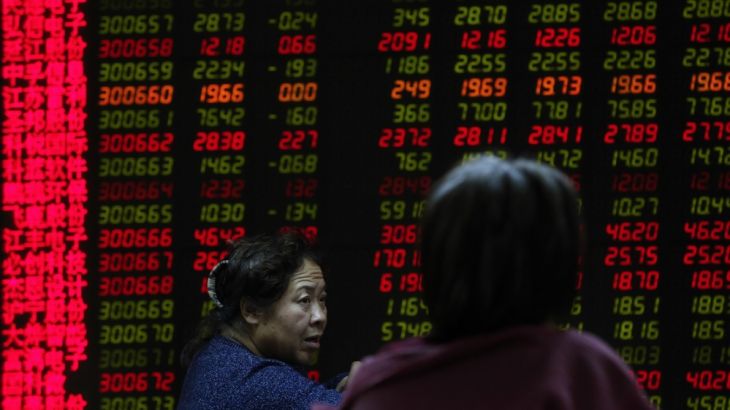
Is China’s economy slowing?
The same old fears about a slowdown in China shake global financial markets in the New Year.
While both sides agreed to a 90-day truce last month, the China-US trade war is evident for the world to watch. That countdown expires at the end of next month and billions of dollars of penalties are still in place. For many economists, what happens next will prove to be the key factor in deciding the outlook for Asia’s economy in 2019.
As the new year gets under way, alarm bells are already sounding about a slowdown in the world’s second-biggest economy and exporting nation. China’s CSI 300 index lost about a quarter of its value in 2018. The fear is that the effect of a trade war is likely to be felt this year, and that could mean weaker growth in countries dependent on trade with China.
Keep reading
list of 4 itemsChina’s economy beats expectations, growing 5.3 percent in first quarter
Inside the pressures facing Quebec’s billion-dollar maple syrup industry
Manipur’s BJP CM inflamed conflict: Assam Rifles report on India violence
“A lot of the metrics coming through over the last couple of days are signalling that the health of the economy really deteriorated during the fourth quarter,” explains Jim McCafferty, head of Equity Research at Nomura Holdings.
China's stock market needs to catch up with its economy
“Having said all that, China’s economy is still growing, it’s still the second-biggest economy globally, and it’s growing at more than five-to-six percent a year, which relative to big economies in the world, is still a huge pace of growth. But nonetheless, the growth of that economy is slowing down and for global investors, they find that quite hard to digest.”
While “China as an economy is the second biggest in the world and its 15 percent of the global economic output, in terms of stock market, it’s only three percent of the overall stock market representation. So what it means is, China’s stock market needs to catch up with its economy and companies will become more sophisticated in the way they deal with investors …”
“[Donald] Trump and Xi [Jinping] both care about the value of the stock market. From Trump’s perspective, a lot of his voters that got him into power care about their 401K, they care about their pension plans, and weakness in the US equity market that we’ve seen in the last quarter doesn’t like Trump’s policy with regard to trade.”
“At the same time, from Xi’s perspective – although he’s got absolute control – it’s very useful for him to have social cohesion. And from a China market point of view, this is not a market owned by sophisticated institutional investors – it’s owned by retail investors. So, if the US and Chinese authorities are able to send signals that actually stimulate the stock market, as well as a wiser economy, that would be welcome.”
Brazil’s Bolsonaro
Brazil’s new president, Jair Bolsonaro, was sworn in as the new year got under way. But his challenges are far from many. Highlighting the challenges facing the new right-wing president, “The focus is clearly going to be on fiscal consolidation from a number of fronts, economic liberalisation, but also streamlining the economy and the public sector workforce,” according to Richard Segal at Manulife Asset management.
|
|
| Bolsonaro’s Challenges (3:25) |
“It’s important to realise how enormous the challenges are and therefore, we’ll be looking for this new government to be making step-by-step progress with only a few steps backwards rather than a big bang approach, which would have the risk of failing.”
While Bolsonaro’s often criticised for knowing very little about financial markets and how the financial world works, “Thus far, he’s indicated that he’ll adopt a hands-off approach towards letting the experts run the economy and the financial markets. So, there’s reason to be encouraged but with many Latin countries, the initial appointments have been welcomed but they haven’t lasted long enough so we have to hold our breath and hope for the best,” says Segal.
Also on this episode of Counting the Cost:
Brazil’s Bolsonaro: Brazil’s new president, Jair Bolsonaro, was sworn in as the new year got under way. He’s already given powers to the agriculture ministry to manage the Amazon rainforest, as John Holman reports from Brasilia.
Apple-China: The head of Apple has partly blamed the US president’s trade war with China for missing out on billions of dollars worth of business. Tim Cook warned of lower-than-expected earnings for the first quarter of this year, also citing weaker demand from China, as Heidi Zhou-Castro reports.
France Internet tax: Tech giants in France now have to pay more tax. The so-called “GAFA tax,” named after Google, Apple, Facebook and Amazon, is to ensure global digital firms pay their fair share. The measure is expected to raise around $570m for France in 2019.
Nigeria savings aid: Economists are warning bad debt and low savings are threatening the survival of Nigeria’s commercial banks. Many people refuse to put their money in accounts, saying banks can’t be trusted, as Ahmed Idris reports from Bodinga.
Greece property: A record 33 million visitors are heading to Greece every year and they’re driving up previously depressed house prices. Non-Europeans are among the buyers and if they spend enough, they get a visa to stay, as John Psaropoulos reports from Athens.